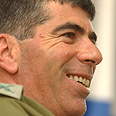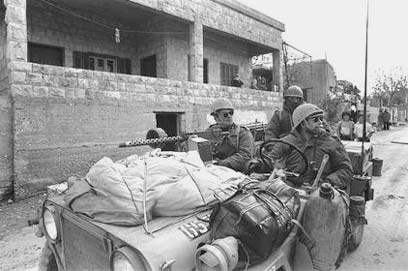
IDF Chief of Staff Gabi Ashkenazi
From a young officer in the legendary Entebbe Rescue Operation, through the Lebanon War, as a result of the resignation of chief-of-stuff Dan Halutz following of the second Lebanon war, Ashkenazi appointed IDF chief
After graduating from the Tel Aviv Junior Command Preparatory School, Ashkenazi joined the Israel Defense Forces in 1972 and served as a combat soldier in the Golani Brigade.
During the Yom Kippur war, which erupted a year later and disrupted Ashkenazi’s officers’ course, he fought on the southern front. After the war he completed the course with honors.
As a young officer he also took part in Operation Entebbe (1976) in Uganda to free the passengers of an Air France plane taken hostage by Palestinian terrorists. Ashkenazi was injured in the Litani Operation in Lebanon, which was launched in retaliation at cross-border attacks waged by Fatah guerillas based in southern Lebanon (1978).

Litani Operation in Lebanon, 1978 (Photo: La'am)
By 1980 he was commanding a Golani battalion and participated in the evacuation of the Sinai settlement of Yamit (1981).
During the first Lebanon war Ashkenazi, who is married with two children, served as Golani’s deputy commander. Following his two-year tenure as brigade commander (1986 -1988), Ashkenazi was appointed Northern Command intelligence chief.
In the early Nineties he served as commander of the northern command armored brigade, and from 1992 to 1994 Ashkenazi headed the IDF's civil administration operations in southern Lebanon and worked closely with the South Lebanon Army.
He then served for four years as the head of operations at the General Staff, and in the summer of 1998 was appointed Northern Command chief.
In May 2000, during his term as head of the Northern Command, former Prime Minister Ehud Barak pulled the army from southern Lebanon, a move Ashkenazi strongly opposed. Soon after the withdrawal three soldiers were kidnapped by Hizbullah terrorists in a cross-border raid near Har Dov.
In 2002 he was appointed deputy chief of staff by then-army chief Shaul Mofaz, and in this capacity oversaw the construction of the West Bank security fence.
Ashkenazi, who holds a bachelor’s degree in political science, resigned two years later when he lost the race for chief of staff to Maj. Gen. Dan Halutz, who was former Prime Minister Ariel Sharon 's choice for the coveted position.
He officially retired from the IDF in May 2005, and was appointed director-general of the Defense Ministry.
Following Halutz's resignation amid a maelstrom of criticism over the army's performance against Hizbullah during the second Lebanon war in the summer of 2006, Ashkenazi stepped into the shoes of the man that beat him to the post just two years earlier.










